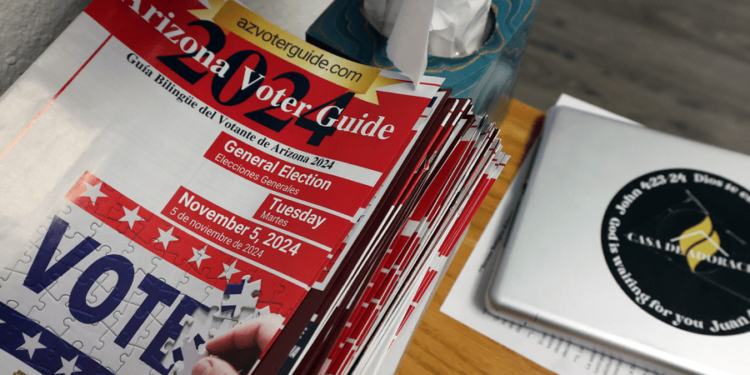
Former President Trump’s election to a second, nonconsecutive term instantly rewrote the playbook for pursuing the Hispanic electorate, burying immigration and identity politics as gateway issues for the Latino vote.
Tuesday’s election drew a line under the idea of a nonmonolithic Hispanic community, making evident that geographic, economic, gender, age, national origin and ideological gaps outweighed any considerations of Latino identity.
In other words, Hispanic voters largely behaved like others in the general electorate and were swayed in either direction by campaign pitches on major issues, especially economics.
“There were a lot of Latinos who didn’t know, or, frankly, not just didn’t know [but] who couldn’t tell you who was with them and who was against them on economics,” said Rep. Greg Casar (D-Texas), a progressive who won reelection by a wide margin Tuesday. “So, I think that not only does the Democratic Party need to be much more clear about who we’re for — I think for Latinos, they wanted to also know who we’re against, so that when the rubber hits the road, that we’re willing to stand up for working people, Latinos included, when we have to stand up to special interests, or we have to stand up against corruption, or we have to stand up against the very rich and powerful.”
Cultural identity issues, on the other hand, proved not to be as galvanizing as some expected.
The final week of the campaign kicked off with a squabble over a slight against Puerto Rico at Trump’s Madison Square Garden rally. Community leaders, pundits, the press and campaign officials all read the incident as a galvanizing moment for Puerto Rican voters to emerge as the key bloc to nudge Pennsylvania toward Vice President Harris.
That moment did not come.
“Part of what it shows us is that a lot of the people who have had very loud microphones and have tried to speak out on behalf of the people of Puerto Rico as a whole, or Puerto Ricans stateside as a whole, maybe aren’t tuned into the reality in their community as much as they thought,” said George Laws García, director of the Puerto Rico Statehood Council.
Harris did beat Trump in Pennsylvania’s Lehigh County — host to Allentown, a key hub for the state’s Puerto Rican community — but she trailed President Biden’s 2020 performance there by about 4,000 votes.
She lost Florida’s Osceola County, that state’s Puerto Rican capital, underperforming Biden by more than 13,000 votes.
Yet the vice president, potentially buoyed by the aftermath of the Madison Square Garden incident, did win overwhelmingly in Puerto Rico’s presidential ballot, a nonbinding exercise that allows those on the island to show their support for a candidate on Election Day.
In that exercise, Harris got 73 percent of the vote, more than Gov.-elect Jenniffer González-Colón (R) and more than the statehood option in the island’s status plebiscite.
“They’re swing voters. They’re going to speak to the candidates that they believe have most spoken to them, and on the island, the candidate that spoke most to them was Jenniffer González, and nationally, Puerto Rican voters on the island felt more connected to the message that they saw coming out of the Harris campaign,” Laws said.
But Harris’s platform did not connect with enough voters at a national level, something observers throughout the political spectrum attribute to her economic message.
“People are going to vote with their wallets, like it happened with Reagan, like it happened with Clinton,” said Ivan Garcia-Hidalgo, a Republican strategist.
“And the wallets are screwed right now for a lot of people. And the problem is she didn’t address it. And they gave her a ton of opportunities — ‘What would you do different?’ and ‘What would you correct?’— and she didn’t do anything.”
It’s still unclear whether Hispanic would-be Democratic voters mostly stayed home or converted to the GOP, but the shift is staggering.
According to exit polls, Trump’s share of the electorate grew by 25 points, rivaling former President George W. Bush’s 2004 record-setting tally.
The Latino political establishment largely remained quiet Wednesday, with a coalition of major civil rights and advocacy groups postponing a scheduled event where they had been expected to deliver their analysis of the Latino vote.
Democrats such as Casar were shocked at the size of the shift but not surprised that the party was unable to break through Trump’s portrayals of the left.
“Trump would lie and say your housing is more expensive, or health care is worse, your wages are worse because of immigrants, right? He would lie and blame immigrants for people’s economic stresses, and Democrats weren’t able to clearly enough say, ‘Housing is more expensive because of Wall Street, not because of immigrants. Your health care is worse because of Big Pharma, not because of immigrants. Wages are stagnating not because of immigrants but because of Elon Musk and Jeff Bezos,” Casar said.
“And without Democrats clearly having a message that pointed the finger at the real villains … all that was left was Trump’s lie. And we Democrats can, fairly or unfairly, cannot survive being mischaracterized as a party that’s out of touch for with working people’s economic interests.”







